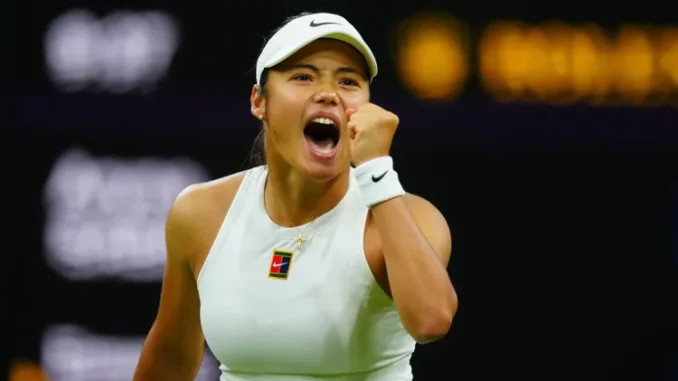
In the electrifying realm of professional tennis, where a single swing can ignite a legacy or cast a lifelong shadow, few narratives capture the paradox of youthful triumph like that of Boris Becker. The German legend, whose name conjures images of fearless dives and booming serves on Wimbledon’s hallowed grass, recently shared a raw confession that reverberates through the sport’s next generation. Now 57, Becker revealed that his historic 1985 Wimbledon victory at just 17—making him the youngest men’s champion in the tournament’s storied annals—may have been as much a burden as a blessing. His words find a mirror in Emma Raducanu, Britain’s 22-year-old star, whose own meteoric rise carries echoes of Becker’s bittersweet journey.
Imagine the summer of 1985: a wiry teenager from Leimen, Germany, strides onto Centre Court, a wild-card underdog facing the formidable Kevin Curren. With a shock of blond hair and a fearless spirit, Boris Becker defies all odds, clinching the Wimbledon title and etching his name into history as a prodigy. That victory was the first of three Wimbledon crowns and six Grand Slams, propelling him into a stratosphere of fame before he could fully grasp its weight. The world crowned him a wunderkind, a boy who conquered tennis’ Everest while still navigating adolescence. Yet, decades later, Becker looks back with a wistful lens. “I’m happy to have won three, but maybe 17 was too young,” he admitted in a heartfelt interview, his voice heavy with reflection. “I was still a child.”
The aftermath was a whirlwind that reshaped his existence. “Whatever you do, wherever you go, whoever you talk to, it becomes a world sensation,” he recalled. “It becomes the headline of some of the most important papers of tomorrow. And you’re just trying to mature, just trying to find your feet in the world.” That seismic shift “changed the road ahead tremendously,” he noted, likening himself to other young sports prodigies—bright stars who often fade too soon. “Usually, they don’t make it to 50,” Becker mused, a stark nod to the toll of early stardom. His words carry a universal truth, one that resonates deeply with Emma Raducanu, whose own ascent mirrors his in uncanny ways.
Raducanu, now 22, stunned the tennis world in 2021, storming to the US Open title at 18 as an unseeded qualifier—the first British woman to claim a Grand Slam in 44 years. Her Flushing Meadows fairy tale, marked by a flawless run without dropping a set, was a masterclass in poise and power. Yet, the euphoria gave way to a relentless grind: injuries, inconsistent form, and the crushing weight of expectation. Reflecting on that pinnacle, Raducanu revealed the duality of her triumph. “That moment on the court, when I was celebrating, I was like, I would literally trade any struggle in the world for this moment,” she said. “Anything can come my way, I will take it for what I have right now because this is the best thing in the world. I promised myself that, on the court that day.” But in quieter moments, doubt creeps in. “And sometimes I think to myself I wish I’d never won the US Open, I wish that didn’t happen,” she confessed, before adding, “Then I am like, remember that feeling, remember that promise, because it was completely pure.”
Her journey since has been a battle against the odds—wrist surgeries, ankle injuries, and the unyielding scrutiny of a nation eager for its next icon. Yet, Raducanu’s resilience shines through. At the 2025 US Open, she reached the fourth round, a gritty testament to her refusal to be defined by setbacks. Her path echoes Becker’s, not just in early glory but in the struggle to navigate its aftermath. Both know the cost of scaling the summit too soon, where every step forward is measured against an impossible peak.
Becker’s story veered beyond the court into a tempest of personal trials. Once flush with millions from prize money and endorsements, he fell prey to excess. “I was too comfortable. I had too much money. Nobody told me ‘no’—everything was possible,” he admitted. “In hindsight, that’s the recipe for disaster.” His fall was stark: in 2022, he faced a two-and-a-half-year prison sentence in the UK for concealing assets to evade bankruptcy debts, a scandal that rocked the tennis world. After serving eight months and facing deportation, despite a decade of calling England home, Becker emerged transformed. Now a respected commentator and coach, his voice a steady presence on BBC broadcasts, he measures every chapter against that teenage triumph. “When you start a second career, everything is measured at this success of winning Wimbledon at 17,” he said, capturing the enduring shadow of early greatness.
Yet, Becker’s reflection isn’t steeped in regret but in hard-earned wisdom. “So you take accountability for your actions, which is very important because you cannot look back any more. You cannot change the past. You can only change the future because you live in today,” he said, a mantra that carries him forward. For Raducanu, still forging her path, these words resonate as she battles to reclaim her spark. The 2025 season, with its looming Wimbledon and beyond, offers her a canvas to paint new victories, free from the weight of 2021.
Their shared narrative is a poignant reminder of tennis’ double-edged sword: the thrill of early triumph can reshape a life, but its echoes demand resilience. As Becker rebuilds and Raducanu fights on, their stories weave a cautionary yet inspiring tale for the sport’s next prodigies. In a game that tests body and soul, the true victory may lie not in the trophies but in the courage to rise, again and again, from the ashes of glory.
Leave a Reply